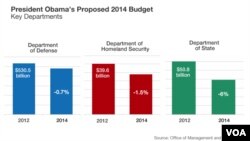WHITE HOUSE —
President Barack Obama has formally unveiled his budget for the 2014 fiscal year beginning in October, calling it a fiscally responsible blueprint for middle class jobs and economic growth. But, Republicans have already dismissed the document.
The $3.77 trillion budget is Obama's attempt to move closer to a so-called "grand bargain" he sought in contentious debt and deficit reduction talks with opposition Republicans.
The budget includes $1.8 trillion in deficit reduction over 10 years, adding to $2.5 trillion in savings Obama says has already been achieved, bringing total savings to $4.3 trillion.
Obama said it represents an effort to get smarter about priorities, while maintaining targeted investments to create jobs, grow the economy, and preserve programs important to the middle class, the poor and the elderly.
He also says it seeks to end what he calls short-sighted crisis-driven decision-making.
"For years, the debate in this town has raged between reducing our deficits at all costs and making the investments necessary to grow our economy, and this budget answers that argument, because we can do both. We can grow our economy and shrink our deficits," said President Obama.
If approved by Congress, at this point highly unlikely, the budget would also replace tens of billions of dollars in mandatory spending cuts that went into effect on January 1.
Obama would close tax loopholes for the wealthy and corporations, and impose a minimum 30 percent tax on people making $1 million or more a year.
The president says he has gone more than halfway to meet concerns of Republicans who have resisted additional tax increases.
House Speaker John Boehner gives Obama some credit for seeking more savings from huge entitlement programs, but says the budget represents another attempt to increase taxes.
"He does deserve some credit for some incremental entitlement reforms that he has outlined in his budget, but I would hope that he would not hold hostage these modest reforms for his demand for bigger tax hikes," said Boehner.
Related video report by Steve Baragona Senate Minority Leader Mitch McConnell said the budget represents the "same old thing" from the president.
"We do not need a budget that piles on tax increase after tax increase," said McConnell. "We need to get government out of the way, so the private sector can actually grow again. We do not need a budget that spends more money we don't have.”
Obama's proposal to obtain savings by using a new formula to calculate cost-of-living adjustments for Social Security has enraged many Democrats.
Vermont Independent Senator Bernie Sanders said it represents a reversal of a pledge Obama made as a presidential candidate.
"When Barack Obama was running for president in 2008, he said that he would not cut Social Security," said Sanders. "We want the president to remember what he said and not go back on his word."
Obama defended his Social Security offer, and reforms in Medicare, but said any compromise must not come at the expense of Americans relying on such programs.
"I do not believe that all these ideas are optimal, but I am willing to accept them as part of a compromise, if and only if they contain protections for the most vulnerable Americans," said Obama.
The Obama budget will go nowhere without bipartisan compromises on Capitol Hill. Senate Democrats and House Republicans have their own separate fiscal blueprints.
The $3.77 trillion budget is Obama's attempt to move closer to a so-called "grand bargain" he sought in contentious debt and deficit reduction talks with opposition Republicans.
The budget includes $1.8 trillion in deficit reduction over 10 years, adding to $2.5 trillion in savings Obama says has already been achieved, bringing total savings to $4.3 trillion.
President Obama's Proposed 2014 Budget
President Obama's Proposed 2014 Budget- Includes $1.8 trillion of additional budget deficit reduction over 10 years
- Closes tax loopholes and reduces tax benefits for the wealthiest
- Includes $400 billion in health savings
- Includes $1 billion investment to launch manufacturing innovation institutes
-
Provides $50 billion for infrastructure investment
He also says it seeks to end what he calls short-sighted crisis-driven decision-making.
"For years, the debate in this town has raged between reducing our deficits at all costs and making the investments necessary to grow our economy, and this budget answers that argument, because we can do both. We can grow our economy and shrink our deficits," said President Obama.
If approved by Congress, at this point highly unlikely, the budget would also replace tens of billions of dollars in mandatory spending cuts that went into effect on January 1.
Obama would close tax loopholes for the wealthy and corporations, and impose a minimum 30 percent tax on people making $1 million or more a year.
The president says he has gone more than halfway to meet concerns of Republicans who have resisted additional tax increases.
House Speaker John Boehner gives Obama some credit for seeking more savings from huge entitlement programs, but says the budget represents another attempt to increase taxes.
"He does deserve some credit for some incremental entitlement reforms that he has outlined in his budget, but I would hope that he would not hold hostage these modest reforms for his demand for bigger tax hikes," said Boehner.
Related video report by Steve Baragona Senate Minority Leader Mitch McConnell said the budget represents the "same old thing" from the president.
"We do not need a budget that piles on tax increase after tax increase," said McConnell. "We need to get government out of the way, so the private sector can actually grow again. We do not need a budget that spends more money we don't have.”
Obama's proposal to obtain savings by using a new formula to calculate cost-of-living adjustments for Social Security has enraged many Democrats.
Vermont Independent Senator Bernie Sanders said it represents a reversal of a pledge Obama made as a presidential candidate.
"When Barack Obama was running for president in 2008, he said that he would not cut Social Security," said Sanders. "We want the president to remember what he said and not go back on his word."
Obama defended his Social Security offer, and reforms in Medicare, but said any compromise must not come at the expense of Americans relying on such programs.
"I do not believe that all these ideas are optimal, but I am willing to accept them as part of a compromise, if and only if they contain protections for the most vulnerable Americans," said Obama.
The Obama budget will go nowhere without bipartisan compromises on Capitol Hill. Senate Democrats and House Republicans have their own separate fiscal blueprints.








